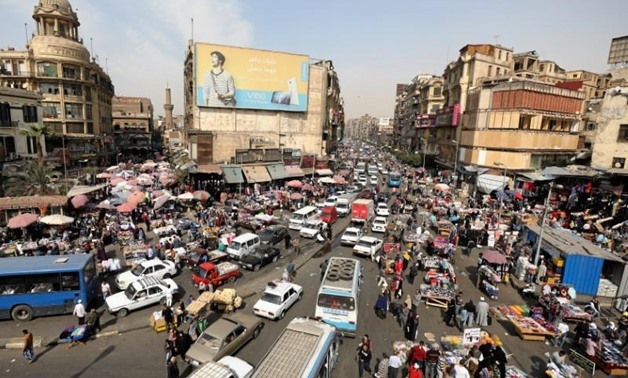
A general view of a street in downtown Cairo, Egypt March 9, 2017. Picture taken March 9, 2017. REUTERS/Mohamed Abd El Ghany - RTX30OAU
CAIRO – 19 October 2018: Another call for changing street names in Egypt was raised, demanding to omit all the names of former Muslim Brotherhood (MB) leaders off the streets.
Journalist Abdel Rahim Ali called on Minister of Local Development Mahmoud Shaarawy to review the names of Egypt's streets, and swiftly get rid of the names of members of the terrorist-designated organization, replacing them by martyrs’ names.
Editor-in-chief of Al-Bawaba News, Ali, said in his press statement on Oct. 18 that his demand is meant “to raise public awareness about major sacrifices of our heroes in the army and police to fight terrorism, and to erase a black era when terrorists took control of the Egyptian decision and named the streets after their leaders.”
The move is not the first of its kind as a number of streets in Delta’s Beheira governorate had their names changed. According to Beheira governor Hisham Amna, a street that used to be called Sayyid Qutb (former MB leader) in Damanhur is now named after former Defense Minister Abdel Halim Abu Ghazala, and another street now carries the name of former interim President Adly Mansour after it used to carry the name of Hassan el-Banna (the founder of MB).
It is believed that many streets are named after members of the Brotherhood in different governorates across Egypt, including a street also called Hassan el-Banna in Abu Hilal district west Minya city, Upper Egypt.
Ali, who is also a parliamentarian, pledged to follow up on his demand at the House of Representatives and in media platforms, stressing that it is a duty to fulfill “to establish a future that honors heroes and holds terrorists accountable for their crimes."
The Muslim Brotherhood has been designated as a terrorist organization since December 2013, after it was accused of being involved in terrorist attacks and riots that followed the ouster of President Mohamed Morsi. Many leaders and members of the group are either held in prison, facing trial over terror-related charges or at-large.
In February, Egyptian authorities omitted the name of Sultan Selim I from a Cairo street after an official request submitted by Mohamed Sabry al-Daly, professor of contemporary history at Helwan University. Daly argued that the Ottoman ruler was not a patriotic symbol, but rather an invader who controlled Egypt and capitalized its resources.
Selim invaded Cairo 500 years ago, marking the end of the Mamluk era in the country. The street was named after him in the second half of the 19th century, under the reign of Mohamed Ali.
Sultan Selim I was born on October 10, 1470, in Amasya, Turkey. He was the youngest son of Sultan Bayezid II.
Additional Reporting by Hend Safwat

Comments
Leave a Comment